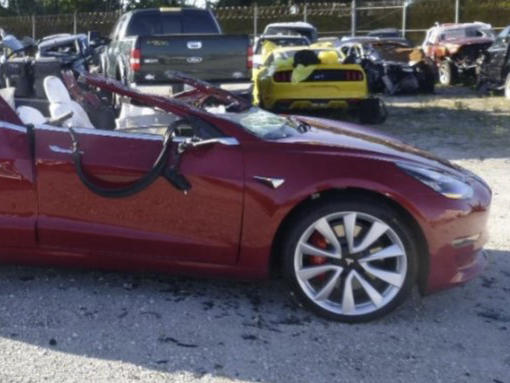Section Branding
Header Content
Judge says evidence shows Tesla and Elon Musk knew about flawed autopilot system
Primary Content
A Florida judge says a lawsuit against Tesla and its autopilot driving car can go to trial, adding to the company's legal woes over the technology.
Palm Beach County Judge Reid Scott ruled that there was "reasonable evidence" to conclude that Tesla owner and CEO, Elon Musk, and other company executives knew that the vehicle's autopilot system was defective. But they continued to tout its capabilities and sell it anyway.
The suit stems from a deadly crash in 2019, in which Jeremy Banner switched on the autopilot function on his Tesla Model 3 about 10 seconds before it drove under the trailer of a semi-truck. The collision sheared off the top of the car, killing Banner.
"The car driver, traveling at a recorded speed of 69 mph, did not apply the brakes or take any other evasive action to avoid the truck, which was crossing in front of him at about 11 mph," the National Transportation Safety Board said in a report.
After the crash, the car continued to coast until it stopped in a median about 1,680 feet from where it struck the semitrailer.
Tesla did not respond to a request for comment from NPR. Musk eliminated the company's media and public relations department four years ago.
Court documents in the case were intended to remain sealed but became temporarily available on Wednesday on the Palm Beach County Court's website, The Associated Press reported. They have since been removed.
The suit was filed by Banner's wife, Kim Banner, who has accused Tesla of gross negligence and intentional misconduct.
In the ruling, Scott said Banner's accident is "eerily similar" to Tesla's first autopilot-related death in 2016. In that case, a Model S also smashed into a semi-truck, chopping off the top of the vehicle and killing the driver.
At the time, Tesla addressed the fatal accident in a blog post, writing: "Neither Autopilot nor the driver noticed the white side of the tractor trailer against a brightly lit sky, so the brake was not applied. The high ride height of the trailer combined with its positioning across the road and the extremely rare circumstances of the impact caused the Model S to pass under the trailer, with the bottom of the trailer impacting the windshield of the Model S."
According to Reuters, Scott said the company "made strong public statements and engaged in a marketing strategy that painted the products as autonomous" despite evidence that it was flawed.
The decision out of Florida comes on the heels of a legal victory for Tesla in California. In October, a judge there said Tesla's driver-assistance software was not to blame in a car crash that killed a driver and seriously injured two passengers.
No new trial date has been set for the Palm Beach case.
Copyright 2023 NPR. To see more, visit https://www.npr.org.

